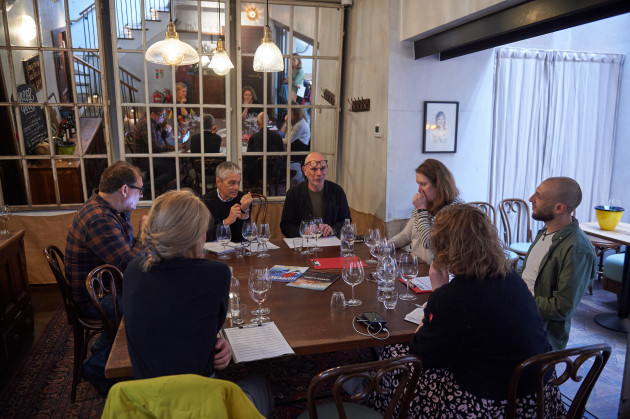
Round table: Sustaining the trade
Imagine a near future where there is little need for talk of sustainability. This would be coupled with an overarching accreditation that joins the dots for sustainably-minded consumers, with drinks companies naturally taking an holistic view of all aspects of their businesses, aligned with their partners up and down the supply chain. There would, of course, be those left behind, who had failed to embed sustainability in their DNA. But such companies will have become few and far between as the combined power of green consumer purchasing and supply-partner pressure increasingly left such organisations by the wayside, as relics of a bygone era.
This was the perhaps hopeful picture proposed during the summing up by a panel at a recent Harpers round table, ‘Harnessing Organic for Sustainability’, which took place at Brixton’s The Laundry, in partnership with sustainably-driven Sicilian producer The Wine People (TWP).
The relationship between ‘organic’ and ‘sustainable’ was debated, asking if the recognition of the former could provide a more useful pathway or ‘in’ for communicating the myriad aspects of the latter, with the confusing proliferation of pathways and certifications for (especially) sustainability also explored.
- Read more: Lanzarote’s battle to protect tradition
As Marloes Klijnsmit, brand manager and sustainability champion at Jeroboams, said, “it sometimes feels as if we keep having the same conversations over and over, but there’s not fast enough change”.
Change, though, is happening and as Rebecca Murphy from North South Wines added: “I believe that in the future my role as sustainability manager won’t exist, because it’s just going to be business.
“We’re in this transition period, as businesses are learning what sustainability means and the whole approach to it, but in the future every business will have to be sustainable.”
The point had been made by TWP’s president Stefano Girelli that wine grapes, as a particularly climate-sensitive crop, were at the forefront of relaying the ongoing impacts of climate change. And, as such, they are acting as a quite alarming barometer to the speed at which the world is not just warming, but its weather becoming ever more unpredictable and extreme. This, he said, made the pressing issue of tackling climate change even more obvious within the drinks world because we can all see and taste the effects in our stock in trade.
As to why the current situation finds some companies steaming ahead – such as North South Wines, which TWP has a stake in and has recently achieved B Corp status – while others are dawdling when it comes to embracing sustainability, Murphy suggested that this would soon even out through necessity, as much as will power.
“Climate change is affecting everybody, though it is being felt most in the marginal areas, where people can feel it and see it happening and are reacting to it. And then there are people in the middle where it is not really affecting them yet, it’s just a kind of a concept, but that is going to change; we’re all going to feel the effects and [sustainability] just needs to become standard business,” she said.
Yuri Gualeni, head sommelier and wine buyer at Louie Restaurant, agreed, making the pertinent observation that, “Two hundred years ago we didn’t do these things, screwing with the soil, messing up the climate, so now we’re trying to turn things back to where it was.
“Obviously we created the problem, now we’re trying to fix it, which is easier said than done. But we need to support different levels of sustainability, what people are trying to do, and that way we can look after the planet and for the next generation.”
Klijnsmit, who praised the sustainable advancement of many smaller producers (of the type that Jeroboams actively seeks to work with), raised the point that the bigger companies could and should do more, given their reach and scale.
“There are a lot of smaller producers that farm organically and sustainably… but the vast majority of wine that is consumed around the world is the mass-produced cheaper stuff, that may not be produced in a sustainable way,” she said.
“But the smaller producers don’t make as much difference in the grand scheme of things. The really big players can make a big difference by investing in sustainability, and how they contribute to the reduction of their carbon emissions, and by farming sustainably, can have a big impact on the wine industry because of the enormous volumes they produce.”
Bigger players such as Torres and Jackson Family Estates were singled out as great examples of what could be achieved by such companies, but others, it was agreed, are lagging far behind.
Greg Andrews, director at D Vine Cellars, suggested there was a cultural aspect, whereby “we all want to see better quality fruit and try better quality wines”, which sustainable practices can certainly help to deliver. But he added that he’d “like to see more focus on the hard challenges, from the bottle to the transport, which have a massive impact on sustainability – they are the elephant in the room”.
These aspects, though, were deemed to be “less sexy” for consumers when compared with the more obvious draw of sustainably-farmed vineyards and production, leaving the onus on the trade to put its supply-chain house in order regardless of a likely lack of recognition for that from those purchasing its wares.
A full write up of this Harnessing Organic for Sustainability round table will appear in Harpers Sustainability Report in the May issue.





